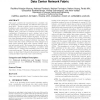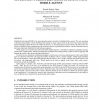38 search results - page 6 / 8 » Inherent Fault Tolerance in Evolved Sorting Networks |
TELSYS
2002
13 years 7 months ago
2002
Native multicast routing protocols have been built and deployed using two basic types of trees: singlesource, shortest-path trees and shared, core-based trees. Core-based multicas...
CISIS
2010
IEEE
2010
IEEE
Computational Grid as an Appropriate Infrastructure for Ultra Large Scale Software Intensive Systems
14 years 2 months ago
—Ultra large scale (ULS) systems are future software intensive systems that have billions of lines of code, composed of heterogeneous, changing, inconsistent and independent elem...
SIGCOMM
2009
ACM
14 years 2 months ago
2009
ACM
This paper considers the requirements for a scalable, easily manageable, fault-tolerant, and efficient data center network fabric. Trends in multi-core processors, end-host virtua...
IADIS
2003
13 years 9 months ago
2003
Distributed data mining (DDM) is the semi-automatic pattern extraction of distributed data sources. The next generation of the data mining studies will be distributed data mining ...
TC
2008
13 years 7 months ago
2008
Network structure construction and global state maintenance are expensive in large-scale, dynamic peer-to-peer (p2p) networks. With inherent topology independence and low state mai...


